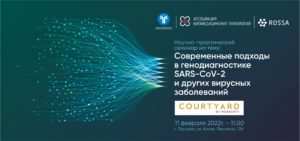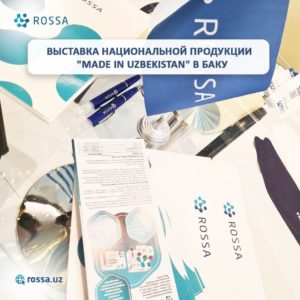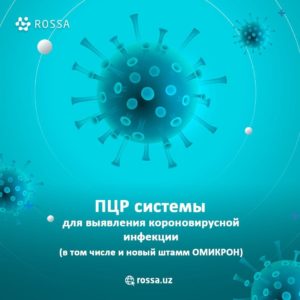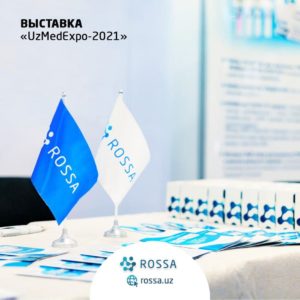Scientific and practical seminar: “Modern approaches in the diagnosis of SARS-CoV-2 and other viral diseases”

On February 11, 2022, a scientific and practical seminar was held at the Courtyard by Marriott Tashkent hotel on the topic: “Modern approaches in the diagnosis of SARS-CoV-2 and other viral diseases”.
The Institute of Immunology and Human Genomics of the Academy of Sciences of the Republic of Uzbekistan, together with the Association of Biomedical Technologies of the Republic of Uzbekistan and with the support of the domestic biotechnology company ROSSA, held a scientific and practical seminar for doctors and laboratory assistants from all regions of the country. More than 100 specialists took part in the event.
The purpose of the seminar is to exchange advanced scientific and practical experience of leading scientists and practitioners of the Academy of Sciences of the Republic of Uzbekistan, the Ministry of Health of the Republic of Uzbekistan, the Service for Sanitary and Epidemiological Welfare and Public Health of the Republic of Uzbekistan in the field of the latest biotechnological research, modern methods and technologies in PCR diagnostics. In addition, during the event, the prospects for the development of biomedical technologies, strategies for their effective localization and commercialization in the Republic of Uzbekistan were discussed.
Recent studies on rapid testing for covid “Omicron”

There have been several studies (link) discussing rapid testing. Research confirms that rapid antigen tests miss omicron in the first few days after infection, when the viral load in the upper respiratory tract is sufficient to infect other people. The researchers observed workers who had to do both PCR and antigen tests every day. The authors could compare when both would catch the infection. Twenty-eight of the 30 sick workers tested negative for antigen, an average of three more days after PCR showed infection, and with a high viral load.Viral load peaks 1-2 days earlier in tests that use saliva as a sample than in tests that require a nasal swab. This also applies to PCR tests. Similar results have been previously obtained in other studies, so the conclusions of this study can be considered independent confirmation.
The delay in rapid tests further contributes to the spread of omicron, at least in Europe, where such tests are widely available. People who have received a negative antigen test continue to communicate and at the peak of the viral load continue to infect others.
Exhibition “Made in Uzbekistan” in Baku

On December 15-17, the exhibition “Made in Uzbekistan” started in the city of Baku (Azerbaijan), within the framework of which, the company “ROSSA” presented a stand with products of its production and development.
The pavilion under the Made in Uzbekistan brand was organized by the Export Promotion Agency under the Ministry of Investments and Foreign Trade of Uzbekistan with the assistance of the Embassy of the Republic of Uzbekistan in Azerbaijan. In addition to “ROSSA”, more than 80 manufacturing companies from different industries take part in the exhibition.
The main purpose of the exhibition is to familiarize with the production potential of Uzbekistan, promote Uzbek products, establish and develop relations between the Uzbek and Azerbaijani business communities. Business meetings, presentations, press conferences and other events are held within the framework of the exhibition for the productive implementation of the tasks of the participants.
The ROSSA company takes an active part in presenting the export potential of the Republic of Uzbekistan on the international market.
Reagent kits for detection – RNA SARS – CoV – 2 “ROSSAmed COVID-19 RT-PCR” and “ROSSAmed EXPRESS COVID 19 RT-PCR”

In connection with the emergence of new strains of SARS – CoV – 2, the sensitivity of the currently existing kits of reagents to new variants is an urgent issue. The variability of a virus is related to its evolution. According to WHO SARS-CoV-2 variant tracking data, new coronavirus variants are characterized by the presence of multiple mutations in the Spike gene.
Reagent kits designed to detect – RNA SARS – CoV – 2 “ROSSAmed COVID-19 RT-PCR” and “ROSSAmed EXPRESS COVID 19 RT-PCR” by RT-PCR with real-time detection of results and a set of reagents “ROSSAmed COVID -19 ISOTHERM” based on the method of colorimetric, isothermal, loop amplification contains primers and fluorescent probes specific for fragments of the ORFlab, E and N genes of the SARS CoV – 2 coronavirus genome according to the reference sequence NC_045512.2.
Enzymes of the SARS-CoV-2 genes, analyzed by ROSSA reagent kits, do not affect areas prone to mutations of Alpha, Beta, Gamma, Delta, Mu, Omicron, etc. strains.
Thus, the presence of mutations in different variants of the SARS-CoV-2 virus does not affect the detection of the COVID-19 virus by ROSSA reagent kits.
XIII International Exhibition “UzMedExpo-2021”

The ROSSA company took part in the XIII International Exhibition “UzMedExpo-2021”, which takes place from October 19 to 21 in Tashkent.
“UzMedExpo-2021” is a demonstration of the achievements of domestic and foreign manufacturers in the field of healthcare.
Exhibitors present a wide range of products and services in such areas as:
?Medical technology, equipment, diagnostics.
?Medical services and insurance.
?Laboratory equipment.
?Dentistry.
?Ophthalmology.
?Pharmacy.
Our goal of participating in this event is an opportunity to tell about the activities of the company “ROSSA”, demonstrate our products to the target audience, as well as search for partners to increase the export potential of the company.




